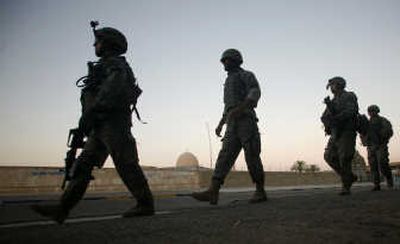General expected to call for troop shift in Iraq

WASHINGTON – Intent on demonstrating progress in Iraq, the U.S. military commander is expected by top Bush administration officials to recommend removing American troops from several areas soon, possibly including the al-Anbar province.
According to the officials, Gen. David H. Petraeus is expected to propose the partial pullback in his September status report to Congress. Administration officials who support the current troop increase hope Petraeus’ recommendations will persuade Congress to reject pressure for a major U.S. withdrawal.
The recommendation would authorize U.S. commanders to withdraw troops from places that have become less violent and turn over security responsibilities to Iraqi forces. But it does not necessarily mean Petraeus will call for reducing the overall number of troops. Instead, he could move the forces to another hot spot or use them to create a reserve force to counter any rise in violence.
“That is the form of the recommendation we are anticipating him to come back with,” said a senior administration official. But referring to the redeployment options, the official added, “I just don’t know which of those categories he is going to be in.”
Petraeus has not told the White House where he might recommend reductions. But military commanders in recent briefings have indicated that Ninevah province and Mosul in Kurdish-controlled northern Iraq, like al-Anbar province in the west, could be suitable sites for U.S. withdrawals.
U.S. commanders have found that pulling out too soon and leaving pacified areas to unprepared Iraqi troops can lead to a resurgence of militant activity. In Mosul, where U.S. officials have slashed the number of forces, a series of bomb attacks Tuesday killed at least 175 people.
Tal Afar, a town northwest of Baghdad that has been cited by President Bush as a key U.S. success, also might be undergoing a rise in violence after a period of stability.
Some officials say they expect Petraeus will push for maintaining the current force level for at least six months, arguing that it would allow him to build upon security improvements in Baghdad. U.S. force levels reached 162,000 this month, an increase of about 30,000 from the beginning of the year, when the U.S. troop surge began.
Another defense official, who has been part of Iraq planning but skeptical of the troop increase, said moving troops out of al-Anbar could make sense to the White House, because doing so would enable the administration to show that improved security translates into a reduction in forces.
Cutting troops in al-Anbar also would eliminate the need to request more forces to secure areas around Baghdad, where the U.S. has been focusing much of its military effort.
“If the Marines are having so much success in al-Anbar, maybe we redeploy them to some other hot spot,” said the defense official. Administration officials have cited improved ties with local Sunni leaders in al-Anbar with helping ease violence and curb the power of the insurgency.